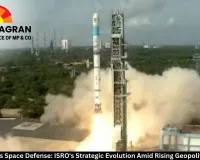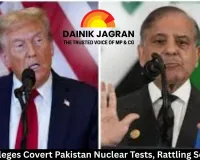Bangladesh Nationwide Shutdown: Awami League Rages Against Sheikh Hasina Death Sentence, Demands Yunus Resignation Amid Rising Tensions
Digital Desk
In a dramatic escalation of political turmoil, Bangladesh's banned Awami League has plunged the nation into a nationwide shutdown today, protesting the shocking death sentence handed to former Prime Minister Sheikh Hasina by the International Crimes Tribunal (ICT).
The verdict, delivered just yesterday on November 17, has ignited fierce backlash, with the party labeling it a "politically motivated sham" and calling for the immediate resignation of interim government chief Mohammad Yunus.
As streets across Dhaka and beyond remain tense under heavy security, reports of sporadic violence and protests highlight the fragility of the country's post-uprising stability.
Sheikh Hasina Death Sentence: A Verdict Rooted in 2024 Student Protests Crackdown
The ICT's ruling marks a pivotal moment in Bangladesh's turbulent recent history. Sheikh Hasina, 78, who fled to India in August 2024 amid a deadly student-led uprising that claimed up to 1,400 lives, was convicted in absentia of crimes against humanity. The tribunal accused her of masterminding the brutal crackdown on protesters, including ordering murders and inciting violence during the July 2024 movement that ultimately toppled her 15-year regime.
Co-accused former Home Minister Asaduzzaman Khan Kamal also received the death penalty, while ex-IGP Abdullah Al-Mamun was sentenced to five years as a government witness. The court ordered the confiscation of Hasina and Kamal's properties, drawing applause from those in the courtroom but outrage from her supporters. Hasina's son, Sajeeb Wazed, swiftly denounced the trial as a "sham," alleging laws were altered to fast-track the verdict and questioning its legitimacy.
Critics, including Awami League leaders, point to procedural flaws: the trial spanned just two months from August 14, with hearings on only 20 days, testimony from 54 of 84 witnesses, and the chief judge absent for a full month. Ironically, the ICT itself was established by Hasina in 2010 to prosecute 1971 war crimes—a tool now turned against her.
Awami League Shutdown Grips Bangladesh: Protests Erupt, Violence Reported
The Awami League, outlawed by Yunus's interim administration ahead of February 2026 elections, wasted no time in mobilizing. Party leader Jahangir Kabir Nanak released a fiery video on Facebook, branding the verdict "biased" and urging a "total nationwide shutdown" today to demand Yunus's ouster and his ministers' resignation. Hasina herself, from exile, echoed the call in an audio message, praising supporters and vowing resistance against what she called the "extremist" interim government.
By midday, Dhaka's streets were a mix of eerie calm and simmering unrest. Heavy deployments of police, paramilitary forces, and border guards patrolled major cities, preventing large gatherings. Yet, pockets of defiance emerged: hundreds protested outside the demolished residence of Hasina's father, Sheikh Mujibur Rahman, in Dhanmondi 32, hurling stones and clashing with police who responded with batons and stun grenades. Overnight into today, violence flared in five districts, with two schools and eight vehicles torched, according to local media.
Social media buzzed with real-time footage of rallies, shutdown enforcers blocking roads, and even international solidarity—British Bangladeshis took to London's Tower Hamlets streets in protest. One viral clip showed Awami League flags waving amid chants against the "kangaroo court," while fringe voices online escalated rhetoric, calling for more extreme actions. Despite the shutdown's momentum, authorities reported minimal disruptions in business hubs, crediting preemptive security measures.
| Key Protest Hotspots | Reported Incidents |
| Dhaka (Dhanmondi 32) | Clashes with police; stun grenades used |
| Five Rural Districts | Schools and vehicles set ablaze |
| Chittagong & Sylhet | Road blockades; small rallies dispersed |
| Nationwide | Social media mobilization; calls for Yunus ouster |
Yunus Government Responds: Extradition Demand to India, Media Crackdown
Interim Chief Adviser Mohammad Yunus, a Nobel laureate thrust into leadership post-uprising, has doubled down on the verdict's legitimacy, hailing it as "justice served" and renewing calls for India's extradition of Hasina and Kamal. In a bold move, the government ordered media outlets to halt circulation of Hasina's statements, citing risks to public order. Human rights groups like Ain o Salish Kendra warn of ongoing mob violence, with 261 deaths linked to post-August 2024 unrest, urging restraint amid fears of election boycotts.
The Awami League's ban from polls has fueled accusations of favoritism toward newer parties like the National Citizen Party, threatening the legitimacy of the upcoming February vote. Hasina's son warned of potential disruptions if the ban persists, hinting at broader instability.
India-Bangladesh Relations Tested: New Delhi's Cautious Stance on Sheikh Hasina Verdict
India, Hasina's refuge since her ouster, has navigated the crisis with diplomatic finesse. The Ministry of External Affairs (MEA) acknowledged the ICT ruling, reaffirming commitment to Bangladesh's "peace, democracy, and stability" while pledging "constructive engagement" with all stakeholders. Dhaka's extradition demand puts New Delhi in a bind, given Hasina's historical ties and India's strategic interests in the region.
Experts like US Ambassador-at-Large Michael Moriarty note Bangladesh's shift from one-party dominance but caution against escalating violence, predicting short-term unrest without full-scale chaos. Globally, outlets from BBC to Al Jazeera highlight the verdict's implications for transitional justice in fragile democracies.
What Lies Ahead for Bangladesh Amid Sheikh Hasina Death Sentence Fallout?
As the shutdown unfolds, Bangladesh teeters on a knife-edge. The Awami League's defiance underscores deep divisions from the 2024 protests, but heavy security has so far contained major flare-ups. With elections looming, the Yunus administration faces mounting pressure to balance accountability with reconciliation—failure could unravel the hard-won progress toward democracy.









.jpg)

